The First Kingdom ©

The first kingdoms began with grain.
According to the foundation legend of Egypt, Assur(Osiris) was the first king of the first kingdom on earth whom Isis resurrected from the dead. He was the ancestral father-god of Egyptian civilization. According to the foundation legend, Assur was the "inventor" of agriculture. In Egyptian art, Assur is nearly always depicted with his shepherd's crook and grain flail. The crook and flail identify him as the ancestral father god of grain farmers and domesticators of animals. Assur is clearly the prototype for Biblical Adam who was the father of Cain and Abel who were tillers of soil and herders of sheep.
Agriculture began with the meltdown of the Ice Age. The first agrarian civilizations transformed the human economy from hunting and gathering to production.
However, the Mediterranean Basin was another matter. During the Ice Age, much of the Mediterranean Basin was a vast grassland populated by herds of grazing animals and the predators who hunted them – including our ancestors. Europe was densely forested and difficult to penetrate. Rising sea level in the Mediterranean squeezed the human and animal population of much of the Mediterranean Valley into a small area at the eastern end of the Mediterranean. Overpopulation of the lands around the Mediterranean severely overtaxed the available resources. New technologies and a new social order resulted from the melt down of the Ice Age. It began in the lands surrounding the Mediterranean.
See the
Ice Age page on this website.
The first kingdoms were the first production-based economies.
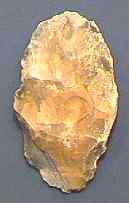
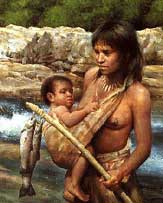 The evidence of worked-stone tools reveals that humans have lived by some form of hunting and gathering economy for as long as they have been human. Hunting and gathering had been the only lifestyle of humanity for two million years until 11,000 years ago when suddenly it changed — the Ice Age melted down. The Ice Age didn't simply melt down. It collapsed. The Stone Age economy of our ancestors collapsed with it. Compared to the build up phase of the Ice Age, the melt down came on suddenly and proceeded swiftly. Plants, animals, and people had to adapt to their rapidly changing environment. The melt down of the Ice Age caused radical and permanent changes in the evolutionary course of humankind. We became producers instead of simply foraging for a living.
The evidence of worked-stone tools reveals that humans have lived by some form of hunting and gathering economy for as long as they have been human. Hunting and gathering had been the only lifestyle of humanity for two million years until 11,000 years ago when suddenly it changed — the Ice Age melted down. The Ice Age didn't simply melt down. It collapsed. The Stone Age economy of our ancestors collapsed with it. Compared to the build up phase of the Ice Age, the melt down came on suddenly and proceeded swiftly. Plants, animals, and people had to adapt to their rapidly changing environment. The melt down of the Ice Age caused radical and permanent changes in the evolutionary course of humankind. We became producers instead of simply foraging for a living.
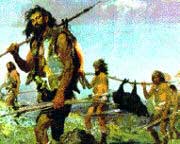 During the Ice Age, the climate was relatively stable. Plants and animals adapted gradually to their slowly changing environment. The human population of planet earth was very small. People lived in harmony with their environment and in balance with their food supply. Their population never grew beyond the available resources. Some of our ancestors were mobile groups who ranged over large areas following the seasonal migrations of herd animals and the ripening of natural "crops." Others lived in relatively permanent settlements around lakes and river estuaries. The melt down of the Ice Age had little effect on the hunting and gathering lifestyle of humans over most of the planet. Beyond an initial period of adjustment, they went on living their lives as they had always lived. The warming of the climate was probably beneficial to the human economy over most of the earth.
During the Ice Age, the climate was relatively stable. Plants and animals adapted gradually to their slowly changing environment. The human population of planet earth was very small. People lived in harmony with their environment and in balance with their food supply. Their population never grew beyond the available resources. Some of our ancestors were mobile groups who ranged over large areas following the seasonal migrations of herd animals and the ripening of natural "crops." Others lived in relatively permanent settlements around lakes and river estuaries. The melt down of the Ice Age had little effect on the hunting and gathering lifestyle of humans over most of the planet. Beyond an initial period of adjustment, they went on living their lives as they had always lived. The warming of the climate was probably beneficial to the human economy over most of the earth.

An Ice Age Mediterranean Scene as it may have appeared.
Rising sea level compelled people and animals to adapt to diminished resources. Animal populations died back to the level of their food supply. Some of them went extinct. People survived by adopting new survival strategies. They began altering their lifestyles AND altering their environment. They began to till the earth and protect animals they had formerly hunted. Some opted for raiding others as their main survival strategy. Our ancestors became farmers, herders, and raiders.
The new human economy of the Mediterranean region became a production-based economy.
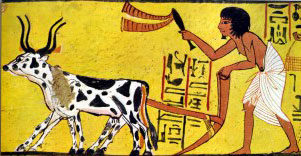 Production required new technology that humans had never used. Their production economy required production tools different than hunting tools. Farming required food storage capacity that they hadn't formerly needed. Their new economy required stability in place of the mobile lifestyles they had formerly lived. The changeover from hunting and gathering to production was truly a momentous event in the evolution of humankind.
Production required new technology that humans had never used. Their production economy required production tools different than hunting tools. Farming required food storage capacity that they hadn't formerly needed. Their new economy required stability in place of the mobile lifestyles they had formerly lived. The changeover from hunting and gathering to production was truly a momentous event in the evolution of humankind.
Along with new technologies, a whole new social order had to develop. The new economy required planning to promote the process of production. It required protection from raiders and other disasters. The new social order required a means to distribute the products of production and to conserve their resources through seasons between crops. Their new social order required a much more organized community than the old order required. It required organization on a larger scale than had ever been attempted.
According to the foundation legend of Egypt, Assur was the first king of the first kingdom on earth and he was the "inventor" of agriculture. Assur arose as a great enlightened leader in a period of disorder and strife following the flooding of the Mediterranean Basin. A number of early civilizations trace their origins to an individual who rose from the sea. Assur established a kingdom that provided the social and economic structure for a larger and more stable society. He brought order out of chaos. Assur taught the value of cooperation and organization. He provided the stability and foresight in planning that the new economy needed. Assur was a primitive genius. He was an organizer. He organized an efficient work force and effective fighting force that unified a large number of warring clans. He forged them into a single social and economic unit. They were the original UrReans.
See the Sunwing page on this website for a definition and discussian of UrReans.
The needs of an agrarian society to build and maintain an irrigation system required a high order of planning, organization, and cooperation.
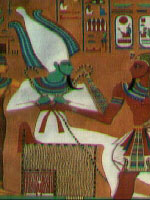
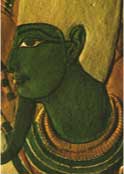 Assur differed from other warlords of the period. He wasn't just a warrior-raider. He protected producers and fostered production. According to the legend of Assur, he cleared jungles, drained swamps and dug canals. He discovered which plants were fit for food and which were good for medicine. He cleared the land of noxious weeds and stinging insects. He rid the countryside of dangerous men and abolished cannibalism. In Pagan religion, Assur is revered as the "inventor" of agriculture. In Egyptian art he is often colored green as the god of agriculture. He introduced a system of work-gang agriculture distinct from family plots. Just the fact that an irrigation system requires individuals to work together to dig and maintain a network of canals was surely an organizing and unifying force in early Nile civilizations.
Assur differed from other warlords of the period. He wasn't just a warrior-raider. He protected producers and fostered production. According to the legend of Assur, he cleared jungles, drained swamps and dug canals. He discovered which plants were fit for food and which were good for medicine. He cleared the land of noxious weeds and stinging insects. He rid the countryside of dangerous men and abolished cannibalism. In Pagan religion, Assur is revered as the "inventor" of agriculture. In Egyptian art he is often colored green as the god of agriculture. He introduced a system of work-gang agriculture distinct from family plots. Just the fact that an irrigation system requires individuals to work together to dig and maintain a network of canals was surely an organizing and unifying force in early Nile civilizations.
Assur and his descendants conquered and bred widely. "And it came to pass, when men began to multiply on the face of the earth, and when daughters were born unto them, that the sons of God saw the daughters of men that they were fair; and they took them wives of all which they chose. . . There were giants in the earth in those days; and also after that, when the sons of God came in unto the daughters of men, and they bare children unto them, the same became mighty men which were of old, men of renown." Gen. 6: 1-4. Those giants were Assur and his descendants founding the first kingdoms. They were the original UrReans.
By love, and by war, Assur founded the new social order of human civilization that followed the melt down of the Ice Age. He founded the first kingdom of the age of kingdoms. In subsequent generations, his descendants founded a vast prehistoric empire of related kingdoms. That ancient empire rose, prospered, and fell before the advent of writing. Fragments of the history of those prehistoric times following the melt down of the Ice Age come down to us in the legends and stories of ancient gods and heroic deeds. Stories of Atlantis, Noah's Ark, the Babylonian fish/man/god, Oannes, and Johah and the Whale, are all fragments of the history of the melt down of the Ice Age. The legend of Assur is the most complete and best preserved of those stories.
|
Reader responses are invited. |
Return to Home Page . . . Return to Table of Contents Hub
Links to related pages:
The Ice Age . . . Pagan Evolution . . . Alphabet Page B . . . Alphabet Page K